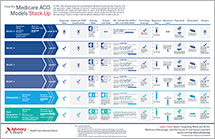Auto logout in seconds.
Continue LogoutThe U.S. uninsured rate has declined since the Affordable Care Act (ACA) took effect in 2010, but the percentage of underinsured U.S. adults has grown, according to a survey brief from the Commonwealth Fund released Thursday.
Health Insurance 101: Get the slide decks
Survey brief details
The survey brief is based on the Commonwealth Fund's latest Biennial Health Insurance Survey, which the foundation has conducted since 2000 to examine the extent and quality of health coverage among U.S. adults ages 19 to 64. The survey uses three measures to evaluate whether respondents:
- Had health coverage;
- Experienced a lapse in health coverage in the previous year; and
- Had health coverage with high out-of-pocket health care costs and deductibles, meaning they were underinsured.
According to the Commonwealth Fund, individuals are considered underinsured if their out-of-pocket health care costs take up between 5% and 10% of their annual incomes, or if their health plans' deductibles equal more than 5% of their annual incomes.
Findings
According to the brief, the survey found the percentage of uninsured U.S. adults has decreased from 20% in 2010 to 12% in 2018. However, the survey found that the percentage of underinsured U.S. adults increased from 16% in 2010 to 23% in 2018.
The survey found that the underinsured rate increased the most among U.S. adults enrolled in employer-sponsored health plans. That rate grew from 17% in 2010 to 28% in 2018, reaching about 44 million U.S. adults in 2018, according to the Commonwealth Fund. However, U.S. adults enrolled in health plans purchased in the individual insurance market had higher underinsured rates than those enrolled in employer-sponsored coverage. Among U.S. adults with coverage from the individual market, the underinsured rate increased from 37% in 2010 to 42% in 2018.
According to the survey brief, 41% of underinsured U.S. adults reported delaying needed care because of cost, and nearly 50% of underinsured adults reported having problems with medical bills and debt—which is about twice the rate of U.S. adults who were adequately insured and reported such problems.
In addition, the survey showed the share of U.S. adults reporting health coverage gaps lasting longer than one year decreased from a peak of 57% in 2012 to 31% in 2018.
Recommendations
Researchers in the survey brief recommended steps state and federal lawmakers can take to improve health coverage for U.S. adults.
To increase health coverage rates, the researchers recommended that policymakers:
- Ban or restrict the sale of short-term and other non-ACA compliant health plans;
- Expand Medicaid without eligibility restrictions;
- Expand eligibility for subsidies available under the ACA to help U.S. residents purchase exchange plans; and
- Reverse funding cuts for ACA outreach and navigators.
To reduce coverage gaps, the researchers recommended that policymakers:
- Extend the ACA's open enrollment period;
- Inform the public about special enrollment periods; and
- Simplify the Medicaid enrollment process.
To reduce U.S. adults' out-of-pocket health care expenses, the researchers recommended that policymakers:
- Fund and extend the ACA's cost-sharing subsidies;
- Increase required deductible exclusions;
- Offer refundable tax credits for high out-of-pocket costs; and
- Protect consumers from so-called "surprise" medical bills.
To slow the growth of U.S. health care costs, the researchers recommended that policymakers:
- Address the effects of consolidation and limited competition in the U.S. health care industry;
- Expand primary care use among patients with complex care needs; and
- Implement value-based payments for prescription drugs.
Comments
Commonwealth Fund President David Blumenthal said, "The results of this survey indicate that it may be time for policymakers to pay some serious attention to the relatively quick erosion of employer coverage and its impact on workers."
Sara Collins, the survey brief's lead author and vice president of health care coverage and access at the Commonwealth Fund, said, "The ACA made only minor changes to employer insurance, and the erosion in cost protection has taken a bite out of the progress made in Americans' health coverages since the law's enactment." She said, "Moving forward, it will be essential to protect, and grow, the ACA's coverage gains while also working to ensure people with health insurance can get and afford the care they need" (Baker, "Vitals," Axios, 2/7; Holdren, The Register-Herald, 2/7; Diamond, "Pulse," Politico, 2/7).
Health Insurance 101: Get the slide decks
Confused about the U.S. health insurance system? You're not alone—it's one of the most complicated systems in the world. If you missed our recent webconference series diving deep into the system, don't worry; we've got you covered.
Review the slide decks from our recent webconferences for a quick overview of each program:
Don't miss out on the latest Advisory Board insights
Create your free account to access 1 resource, including the latest research and webinars.
Want access without creating an account?
You have 1 free members-only resource remaining this month.
1 free members-only resources remaining
1 free members-only resources remaining
You've reached your limit of free insights
Become a member to access all of Advisory Board's resources, events, and experts
Never miss out on the latest innovative health care content tailored to you.
Benefits include:
You've reached your limit of free insights
Become a member to access all of Advisory Board's resources, events, and experts
Never miss out on the latest innovative health care content tailored to you.
Benefits include:
This content is available through your Curated Research partnership with Advisory Board. Click on ‘view this resource’ to read the full piece
Email ask@advisory.com to learn more
Click on ‘Become a Member’ to learn about the benefits of a Full-Access partnership with Advisory Board
Never miss out on the latest innovative health care content tailored to you.
Benefits Include:
This is for members only. Learn more.
Click on ‘Become a Member’ to learn about the benefits of a Full-Access partnership with Advisory Board
Never miss out on the latest innovative health care content tailored to you.

